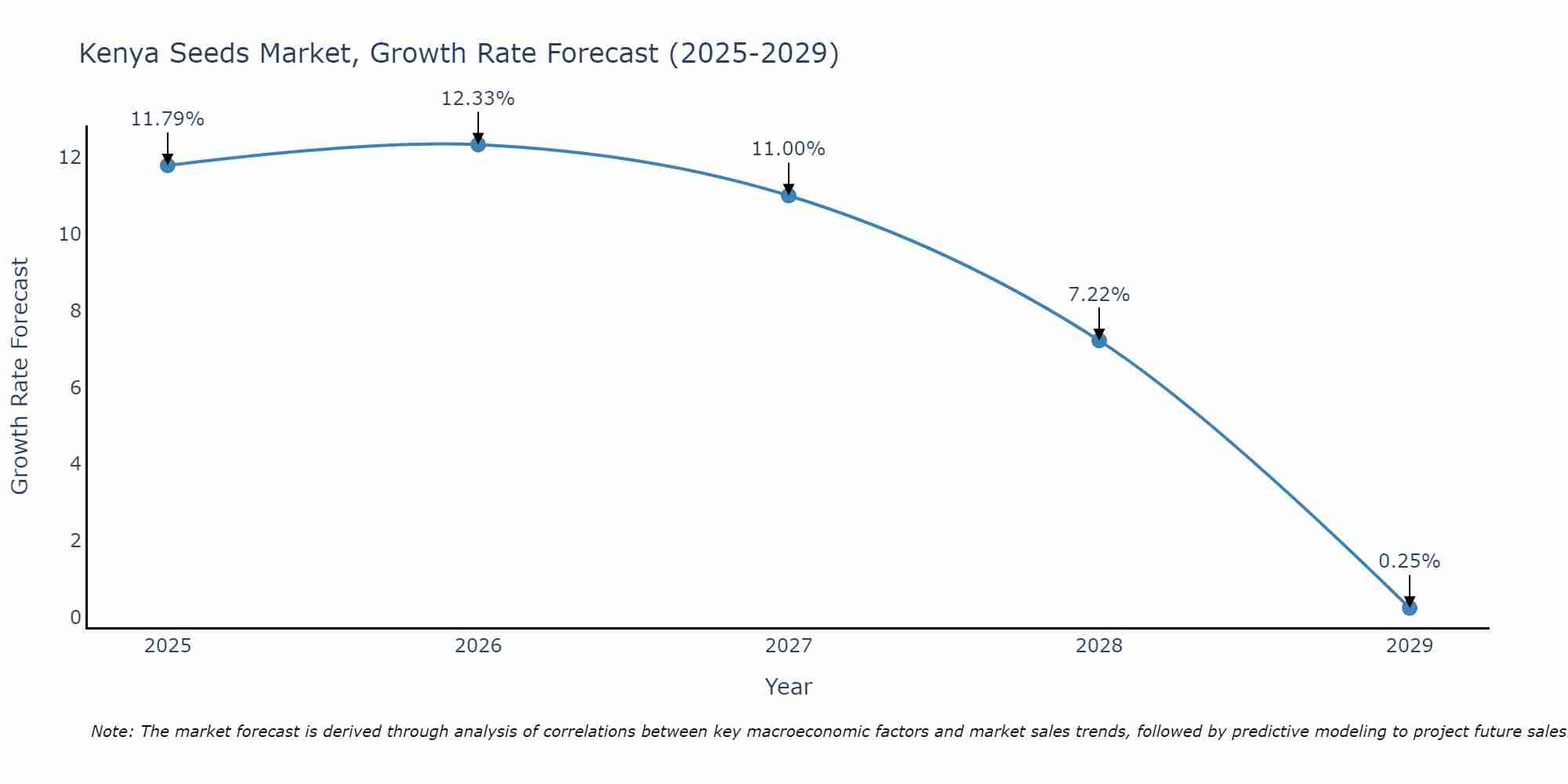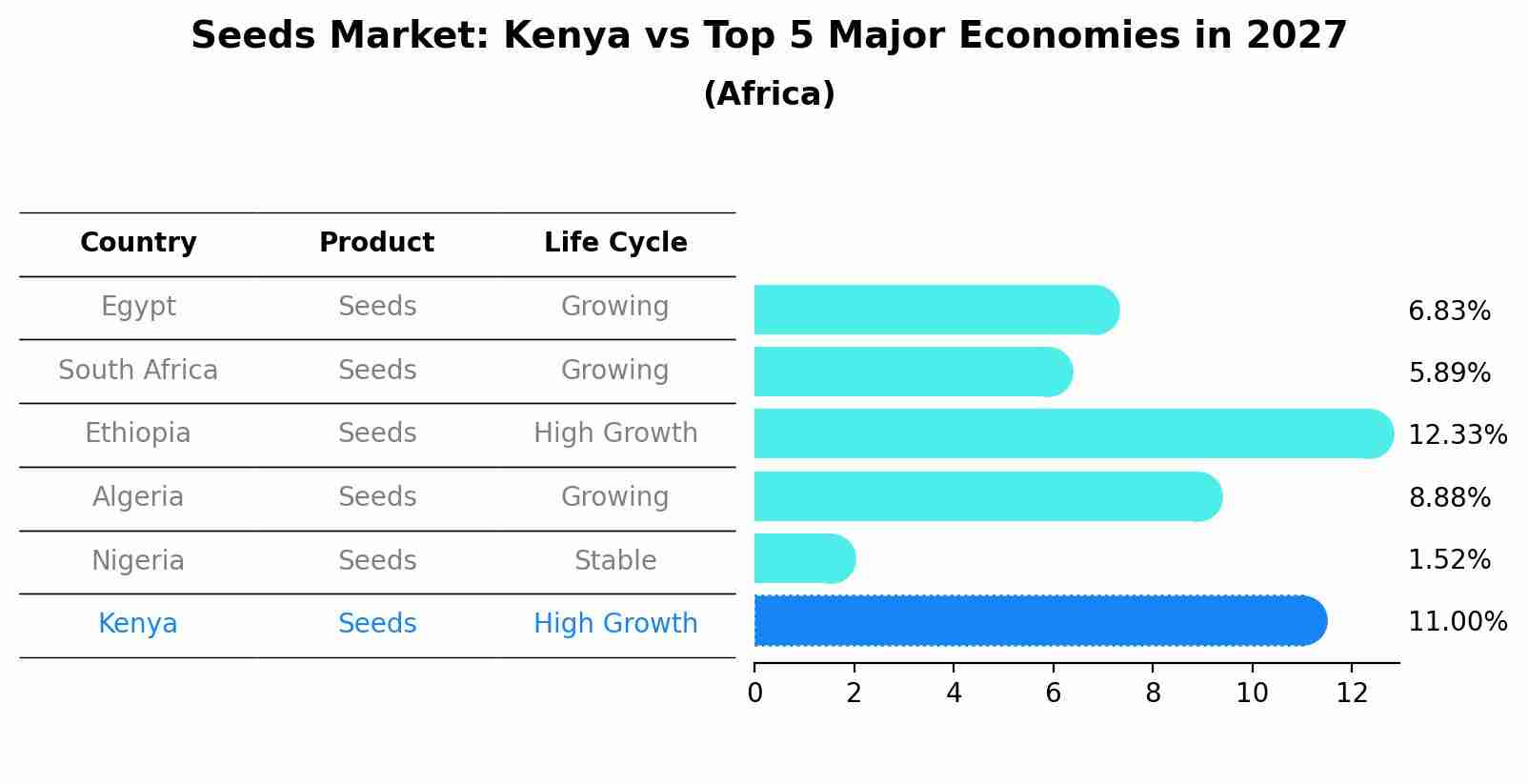Kenya Seeds Market Outlook | Size, Revenue, COVID-19 IMPACT, Growth, Value, Industry, Analysis, Share, Trends, Forecast & Companies
| Product Code: ETC384710 | Publication Date: Aug 2022 | Updated Date: Jul 2025 | Product Type: Market Research Report | |
| Publisher: 6Wresearch | Author: Shubham Deep | No. of Pages: 75 | No. of Figures: 35 | No. of Tables: 20 |
Kenya Seeds Market Size Growth Rate
The Kenya Seeds Market is projected to witness mixed growth rate patterns during 2025 to 2029. The growth rate begins at 11.79% in 2025, climbs to a high of 12.33% in 2026, and moderates to 0.25% by 2029.

Seeds Market: Kenya vs Top 5 Major Economies in 2027 (Africa)
In the Africa region, the Seeds market in Kenya is projected to expand at a high growth rate of 11.00% by 2027. The largest economy is Egypt, followed by South Africa, Ethiopia, Algeria and Nigeria.

Kenya Seeds Market Synopsis
The Kenya seeds market is a dynamic and growing sector driven by increasing demand for high-quality seeds to improve agricultural productivity. Key players in the market include both domestic and international seed companies offering a wide range of seeds for crops such as maize, wheat, vegetables, and fruits. The market is characterized by innovations in seed technology, including the development of hybrid and genetically modified seeds, as well as a growing focus on sustainable agriculture practices. Additionally, government initiatives to support the agriculture sector and promote seed research and development further contribute to the market`s growth. Overall, the Kenya seeds market presents opportunities for seed companies to expand their product offerings and for farmers to access improved seeds to enhance crop yields and food security.
Kenya Seeds Market Trends
The Kenya Seeds Market is witnessing several key trends. Firstly, there is a growing demand for high-quality certified seeds as farmers increasingly prioritize crop yield and quality. Secondly, there is a shift towards the adoption of hybrid and improved varieties that offer better resistance to pests, diseases, and adverse weather conditions. Additionally, there is a rising awareness among farmers about the importance of using quality seeds for sustainable agriculture practices. The market is also seeing an increase in the availability of specialized seeds for niche crops such as vegetables and fruits, catering to the evolving preferences of consumers. Overall, the Kenya Seeds Market is experiencing a trend towards innovation, quality, and sustainability to meet the changing needs of the agriculture sector.
Kenya Seeds Market Challenges
In the Kenya seeds market, challenges include limited access to quality seeds, particularly for smallholder farmers in remote areas. Poor infrastructure and distribution networks hinder the timely delivery of seeds to farmers. Additionally, counterfeit seeds pose a significant threat, affecting both farmer yields and the reputation of legitimate seed companies. Climate change and unpredictable weather patterns also impact seed production and crop yields, requiring the development of climate-resilient seed varieties. Furthermore, lack of awareness and education among farmers about the importance of using certified seeds and adopting modern agricultural practices contribute to low productivity levels in the sector. Addressing these challenges through improved infrastructure, regulatory enforcement, technology adoption, and farmer education is essential for the growth and sustainability of the Kenya seeds market.
Kenya Seeds Market Investment Opportunities
The Kenya Seeds Market presents promising investment opportunities due to the country`s strong agricultural sector and increasing demand for high-quality seeds. Investments in research and development of new seed varieties tailored to local conditions, as well as technologies to enhance seed production and distribution, can yield significant returns. Additionally, partnerships with smallholder farmers to provide access to improved seeds and agronomic support present a growth opportunity. With the government`s focus on promoting modern farming practices and food security, investing in the Kenya Seeds Market can contribute to sustainable agriculture development and profitability. Overall, the market offers potential for investors looking to capitalize on the country`s agricultural potential and the increasing need for improved seed solutions.
Jordan Agar Market Government Policies
The Kenyan government has implemented various policies to regulate the seeds market in the country. One key policy is the Seeds and Plant Varieties Act, which governs the production, marketing, and distribution of seeds to ensure quality and authenticity. The government also established the Kenya Plant Health Inspectorate Service (KEPHIS) to oversee the certification and inspection of seeds to maintain high standards and protect farmers from counterfeit products. Additionally, there are regulations in place to promote the use of certified seeds and encourage the development of a competitive and sustainable seeds industry. Overall, these policies aim to safeguard the interests of farmers, improve crop productivity, and contribute to food security and agricultural growth in Kenya.
Kenya Seeds Market Future Outlook
The Kenya Seeds Market is poised for growth in the coming years, driven by factors such as increasing adoption of advanced seed technologies, rising demand for high-yielding crop varieties, and government initiatives to promote agricultural productivity. With a growing population and expanding agricultural sector, there is a rising need for quality seeds to enhance crop yields and ensure food security. Additionally, the trend towards sustainable agriculture practices and organic farming is expected to drive demand for specialized seeds. Collaboration between seed companies and research institutions to develop innovative seed varieties tailored to local conditions will further propel market growth. Overall, the Kenya Seeds Market is anticipated to experience steady expansion, offering opportunities for seed companies to tap into the country`s agricultural potential.
Key Highlights of the Report:
- Kenya Seeds Market Outlook
- Market Size of Kenya Seeds Market, 2021
- Forecast of Kenya Seeds Market, 2031
- Historical Data and Forecast of Kenya Seeds Revenues & Volume for the Period 2018 - 2031
- Kenya Seeds Market Trend Evolution
- Kenya Seeds Market Drivers and Challenges
- Kenya Seeds Price Trends
- Kenya Seeds Porter's Five Forces
- Kenya Seeds Industry Life Cycle
- Historical Data and Forecast of Kenya Seeds Market Revenues & Volume By Type for the Period 2018 - 2031
- Historical Data and Forecast of Kenya Seeds Market Revenues & Volume By Genetically Modified (GM) Seed for the Period 2018 - 2031
- Historical Data and Forecast of Kenya Seeds Market Revenues & Volume By Conventional Seed for the Period 2018 - 2031
- Historical Data and Forecast of Kenya Seeds Market Revenues & Volume By Crop for the Period 2018 - 2031
- Historical Data and Forecast of Kenya Seeds Market Revenues & Volume By Field Crops for the Period 2018 - 2031
- Historical Data and Forecast of Kenya Seeds Market Revenues & Volume By Fruit & Vegetable Crops for the Period 2018 - 2031
- Historical Data and Forecast of Kenya Seeds Market Revenues & Volume By Availability for the Period 2018 - 2031
- Historical Data and Forecast of Kenya Seeds Market Revenues & Volume By Commercial Seeds for the Period 2018 - 2031
- Historical Data and Forecast of Kenya Seeds Market Revenues & Volume By Saved Seeds for the Period 2018 - 2031
- Historical Data and Forecast of Kenya Seeds Market Revenues & Volume By Seed Treatment for the Period 2018 - 2031
- Historical Data and Forecast of Kenya Seeds Market Revenues & Volume By Treated for the Period 2018 - 2031
- Historical Data and Forecast of Kenya Seeds Market Revenues & Volume By Untreated for the Period 2018 - 2031
- Historical Data and Forecast of Kenya Seeds Market Revenues & Volume By Seed Trait for the Period 2018 - 2031
- Historical Data and Forecast of Kenya Seeds Market Revenues & Volume By Herbicide Tolerant for the Period 2018 - 2031
- Historical Data and Forecast of Kenya Seeds Market Revenues & Volume By Insecticide Resistant for the Period 2018 - 2031
- Historical Data and Forecast of Kenya Seeds Market Revenues & Volume By Other Stacked Traits for the Period 2018 - 2031
- Kenya Seeds Import Export Trade Statistics
- Market Opportunity Assessment By Type
- Market Opportunity Assessment By Crop
- Market Opportunity Assessment By Availability
- Market Opportunity Assessment By Seed Treatment
- Market Opportunity Assessment By Seed Trait
- Kenya Seeds Top Companies Market Share
- Kenya Seeds Competitive Benchmarking By Technical and Operational Parameters
- Kenya Seeds Company Profiles
- Kenya Seeds Key Strategic Recommendations
Frequently Asked Questions About the Market Study (FAQs):
- Single User License$ 1,995
- Department License$ 2,400
- Site License$ 3,120
- Global License$ 3,795
Search
Thought Leadership and Analyst Meet
Our Clients
Related Reports
- Canada Oil and Gas Market (2026-2032) | Share, Segmentation, Value, Industry, Trends, Forecast, Analysis, Size & Revenue, Growth, Competitive Landscape, Outlook, Companies
- Germany Breakfast Food Market (2026-2032) | Industry, Share, Growth, Size, Companies, Value, Analysis, Revenue, Trends, Forecast & Outlook
- Australia Briquette Market (2025-2031) | Growth, Size, Revenue, Forecast, Analysis, Trends, Value, Share, Industry & Companies
- Vietnam System Integrator Market (2025-2031) | Size, Companies, Analysis, Industry, Value, Forecast, Growth, Trends, Revenue & Share
- ASEAN and Thailand Brain Health Supplements Market (2025-2031) | Strategy, Consumer Insights, Analysis, Investment Trends, Opportunities, Growth, Size, Share, Industry, Revenue, Segments, Value, Segmentation, Supply, Forecast, Restraints, Outlook, Competition, Drivers, Trends, Demand, Pricing Analysis, Competitive, Strategic Insights, Companies, Challenges
- ASEAN Bearings Market (2025-2031) | Strategy, Consumer Insights, Analysis, Investment Trends, Opportunities, Growth, Size, Share, Industry, Revenue, Segments, Value, Segmentation, Supply, Forecast, Restraints, Outlook, Competition, Drivers, Trends, Demand, Pricing Analysis, Competitive, Strategic Insights, Companies, Challenges
- Europe Flooring Market (2025-2031) | Outlook, Share, Industry, Trends, Forecast, Companies, Revenue, Size, Analysis, Growth & Value
- Saudi Arabia Manlift Market (2025-2031) | Outlook, Size, Growth, Trends, Companies, Industry, Revenue, Value, Share, Forecast & Analysis
- Uganda Excavator, Crane, and Wheel Loaders Market (2025-2031) | Strategy, Consumer Insights, Analysis, Investment Trends, Opportunities, Growth, Size, Share, Industry, Revenue, Segments, Value, Segmentation, Supply, Forecast, Restraints, Outlook, Competition, Drivers, Trends, Demand, Pricing Analysis, Competitive, Strategic Insights, Companies, Challenges
- Rwanda Excavator, Crane, and Wheel Loaders Market (2025-2031) | Strategy, Consumer Insights, Analysis, Investment Trends, Opportunities, Growth, Size, Share, Industry, Revenue, Segments, Value, Segmentation, Supply, Forecast, Restraints, Outlook, Competition, Drivers, Trends, Demand, Pricing Analysis, Competitive, Strategic Insights, Companies, Challenges
Industry Events and Analyst Meet
Whitepaper
- Middle East & Africa Commercial Security Market Click here to view more.
- Middle East & Africa Fire Safety Systems & Equipment Market Click here to view more.
- GCC Drone Market Click here to view more.
- Middle East Lighting Fixture Market Click here to view more.
- GCC Physical & Perimeter Security Market Click here to view more.
6WResearch In News
- Doha a strategic location for EV manufacturing hub: IPA Qatar
- Demand for luxury TVs surging in the GCC, says Samsung
- Empowering Growth: The Thriving Journey of Bangladesh’s Cable Industry
- Demand for luxury TVs surging in the GCC, says Samsung
- Video call with a traditional healer? Once unthinkable, it’s now common in South Africa
- Intelligent Buildings To Smooth GCC’s Path To Net Zero


















